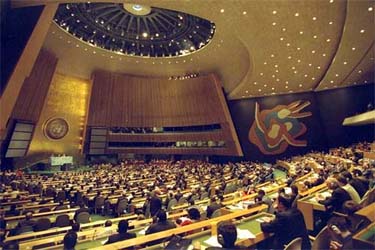 Gay/Lesbian Organization Can Speak! Heated Debate Rocks the Official Round Table on HIV/AIDS IGHRC Reinstated -- Opposition by 9 Muslim Nations Flares |
|
Compiled By GayToday
After a heated two hour debate the General Assembly decided in favor of the motion by a vote of 62 in favor, 0 against, and 30 abstentions. A number of delegations refrained from voting altogether, hoping to avoid a quorum, yet the vote was ruled valid. "We are satisfied with the vote," stated Scott Long, IGLHRC's Program Director. "It is regrettable, however, that the UN had to spend hours confronting the objections to having the voices of gay, lesbian, bisexual and transgender people heard. There is an HIV/AIDS pandemic in the world; the UN should waste no time dealing with the real problems of people with HIV/AIDS." At the General Assembly, the South African delegate reminded his colleagues that "this is a conference about people who are dying from HIV/AIDS. White, black, gay, straight, this is a disease which knows no boundaries."

The United Nations General Assembly The Norwegian representative viewed the vote as a "fight about the soul of the UN," in order to ensure that the organization remains "open, transparent, and relevant." He further stated that cooperation of civil society was particularly important in the battle against HIV/AIDS. "We have witnessed today the role that homophobia and resistance to human rights play in the United Nations," asserted Karyn Kaplan, "what remains to be seen is how these factors will play out the rest of the week." Objections against IGLHRC's participation mirror developments related to the drafting process of the final declaration of the United Nations General Assembly Special Session on HIV/AIDS, where several government delegations have been attempting to delete from the draft declaration any mention of men having sex with men, sex workers and their clients, and injecting drug users and their sex partners as groups at high risk for HIV infection. In addition the draft declaration lacks a comprehensive rights-based approach to HIV/AIDS and is weak in holding governments accountable to human rights standards.
But they requested legal opinions and dwelled on procedures after, saying their right to object should not be denied. Egypt earlier had sponsored a motion that would have excluded the group. This failed by 63 to 46 votes with 19 abstentions. Most ministers, including presidents and prime ministers waited patiently outside the assembly hall until the controversy was resolved by more than 180 nations. Delegates to the U.N. conference were, which is to map out a blueprint to fight AIDS, are also deadlocked on language in the conference's plan of action referring to homosexuals, prostitutes and intravenous drug users. One section of the declaration refers to homosexuals, prostitutes and intravenous drug users as especially vulnerable groups in getting and spreading the AIDS virus. It calls for special attention, including "peer group" education. The Islamic nations as well as the Vatican oppose most Western countries, southern Africans and Latin Americans on singling out these groups. About 36 million people are infected with AIDS or HIV worldwide, with the virus spreading rapidly in Asia and Eastern Europe. Of the affected population, an estimated 25 million live in Africa, U.N. figures show. |


